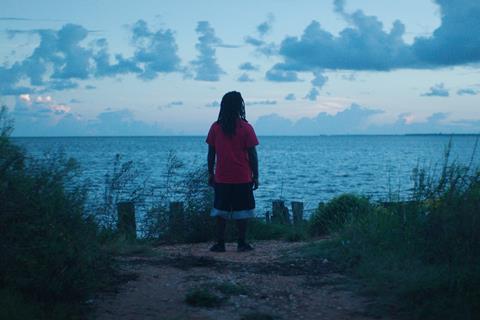Descendant director Margaret Brown talks to Screen about how the community in Mobile, Alabama is still reckoning with the legacy of the last slave ship to reach the US.

Margaret Brown did not hear about the Clotilda, the last recorded vessel to bring illegally enslaved people into the US in 1860, in her history classes at public schools growing up in Mobile, Alabama, the ship’s final destination.
The Clotilda’s local legacy was something Brown’s mother told her about when she was making her 2008 feature documentary The Order Of Myths, which investigates Mobile’s largely racially segregated Mardi Gras traditions, and spotlights a Black queen named Stefannie Lucas and a white queen named Helen Meaher. Her mother told her the white queen’s family, the Meahers, were descended from the owners of the last slave ship. “It wasn’t something that was talked about,” Brown remembers. “It was more whispered around town.” Lucas was a descendant of the enslaved people on the ship, something explored in the film.
The filmmaker was not done with the Clotilda yet. Brown was living in Los Angeles in 2017 when she heard an announcement that the long-lost ship had been discovered. She was reticent at first to delve into the subject matter again — “I thought I’d already told that story. But people from Mobile kept writing to me that the plot had thickened. People told me, ‘It’s not really about the ship, there are other things going on.’”

The supposed discovery of the ship in 2017 turned out to be a false alarm — but that set Brown on a five‑year journey, and she found her new film, Descendant, was about more than the sunken vessel. “There were other powers moving underneath this,” she says. The film concentrates on the contemporary community in Africatown, where many residents are descendants of the Clotilda’s enslaved people from West Africa; the community grapples today with that traumatic legacy, as it also considers how to preserve the Clotilda’s heritage and if justice is possible now.
Brown had first thought the new film would be an opportunity to use her previous access with the Meaher family (Helen Meaher had travelled to film festivals in support of The Order Of Myths). But it soon became apparent the family was not going to speak to her for the new film.
She also had to grapple with the realisation the film was more and more about the Black community in Mobile’s Africatown, and indeed about Blackness in modern America. How could she, as a white filmmaker, tell the story? “That’s the most foundational question for a white person being involved in a story like this — we have to reckon with that,” she says. “I had to figure out the best ways to foreground the stories of Africatown. I’m not necessarily the best person to tell the story, but I am the person who showed up.”
Key collaborators
Brown knew she would have her own blind spots or biases, so made sure to bring on key collaborators. These included Kern Jackson, a professor and folklorist who speaks in the film and also co-wrote and became a co-producer. Brown realised that her friend Essie Chambers, who was a frequent sounding board for her, was effectively acting as a creative producer already so she also earned a producer credit, alongside Brown and her longtime producer Kyle Martin. Participant Media backed the project.
“One of the first things Essie said is that we had to just make a pact with each other that we were going to have the difficult conversations and really go there and be vulnerable with each other,” says Brown. The filmmaker took inspiration from another important African American voice, Zora Neale Hurston, the lauded author and anthropologist who had recorded testimonies from Clotilda survivor Cudjo Lewis in 1927 (eventually published in 2018 as the book Barracoon). Hurston’s book “was part of the vernacular of this film. I wanted her presence and her words to be like the guide of the film,” says Brown, who was inspired to have Clotilda descendants read passages from Barracoon on camera.
With cinematographers Justin Zweifach and Zac Manuel, “We talked a lot about the language of centring the majesty of the people in the film and how we would shoot them… and we also wanted to show the lushness of this neighbourhood. There is blight in that community but there is also a lot of care.”
Raising anchor
One gift from the filmmaking gods was the surprising discovery of the ship in 2019, in the Mobile river. “I honestly didn’t think they would find the ship, but I knew there would be a story anyway about this strong community,” Brown says. “After it was found, we saw the difference this artefact made to how the community was seen and how the community saw itself. That rewired the film.”
By participating in US genealogical TV show Finding Your Roots, Ahmir ‘Questlove’ Thompson had discovered he was a descendant of Charlie Lewis, who had arrived enslaved on the Clotilda. Brown convinced the musician and filmmaker to join Descendant as an executive producer. “He has brought that emotionality and curiosity about his own past,” Brown says. She waited to approach him when the film was deep in post, knowing he would be more likely to join the effort if he could see her approach. “I admire him so much, it’s been incredible getting to know him,” she says, pointing to tangible ways he has helped the film, such as introducing her to musician Ray Angry from The Roots, who composed music for the film alongside Dirk Powell and Rhiannon Giddens.
Thompson has also been passionate with outreach and impact work for the film, which played at Sundance online in January 2022 (winning the documentary special jury award for creative vision), before launching globally on Netflix in October. “When we showed the film in Alabama, he brought his whole family down to Mobile to participate in the celebration that weekend.”
The Obamas
Michelle and Barack Obama have also been crucial champions — their company Higher Ground acquired the film with Netflix at Sundance. “Could there be a better partner? The answer is no,” Brown says, adding how excited she was to tell the Africatown community that the Obamas had licensed the film. “The Obamas and Participant Media did a listening tour to the needs of the community six months before the film came out.” Later, Michelle Obama introduced Descendant at Martha’s Vineyard African American Film Festival in August.
As a daughter of Alabama herself, it has been crucial for Brown to see the reactions of the community there. “We wanted to see a conversation. Articles are written in the paper about reparations and about what restorative justice looks like. We’re having that conversation as a city now.” It was too late for her film, but the Meaher family also released a statement after Descendant was released, saying the actions of their ancestor Timothy Meaher, a wealthy shipyard owner who commissioned the illegal importing of slaves on the Clotilda, were “evil and unforgivable” that “had consequences that have impacted generations of people”.
Brown is working on two new projects, both under wraps: one is a non-fiction show with HBO and A24; the other she says is “non-fiction-ish”.
With much debate about how too much of the non-fiction world is cashing in on true-crime or celebrity stories, Brown is glad films like Descendant have a place. “Audiences like complicated, nuanced stories. I’m driven by what I think deserves my time and energy and brings meaning to the world.”















![[L-R]: Amanda Villavieja, Laia Casanovas, Yasmina Praderas](https://d1nslcd7m2225b.cloudfront.net/Pictures/274x183/6/4/1/1471641_pxl_20251224_103354743_618426_crop.jpg)








![[L-R]: Amanda Villavieja, Laia Casanovas, Yasmina Praderas](https://d1nslcd7m2225b.cloudfront.net/Pictures/100x67/6/4/1/1471641_pxl_20251224_103354743_618426_crop.jpg)
No comments yet